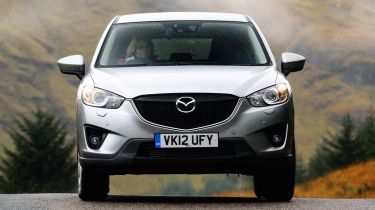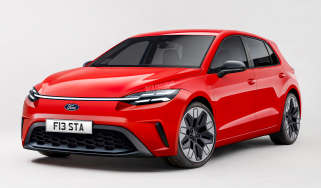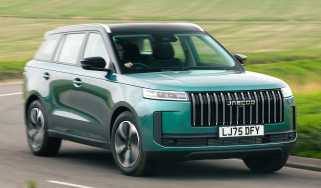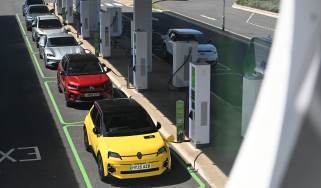Mazda CX-5
Our current class favourite is a tough challenger for the CR-V
While the automatic isn’t our preferred choice, the CX-5 showed its true quality in this test and emerges with another solid win under its belt. It’s not the most spacious car here, but compact proportions and a light kerbweight make it the easiest to live with. Plus, we love how it drives.
Mazda has racked up a string of group test victories with the CX-5, and after triumphing in its first test against crossover rivals, it fought off the unusual but challenging VW Passat Alltrack estate.
We criticised the Mazda in that test for its tall, generic looks, but there are no such problems this time around. It helps that our test car was finished in a lighter shade of silver that shows off the sleek design better. But the CX-5 is also the shortest car here and has the biggest alloy wheels, so it seems quite compact and sporty next to the Honda CR-V.
The subtle chrome strip that runs along the top of the grille and into the headlights looks great, and bright xenons are standard – they’re not even available as an option on the Hyundai Santa Fe.
Even though the Mazda is taller and wider than the Honda, the neat twin exhausts and a small roof spoiler make it look slimmer from the back. Strict weight reduction means the CX-5 is 33kg lighter than the 1,653kg CR-V, but you’d be hard-pressed to tell from inside.
Used - available now
As with the Honda, it’s lavishly equipped with heated leather seats, a reversing camera and keyless go, and while the dashboard’s black plastic is unattractive, it’s logically laid out, with a handy BMW iDrive-style wheel for controlling the big central display.
Sat-nav is extra (£400), unlike in the CR-V, and the CX-5 does without a big panoramic glass roof, but large windows ensure visibility is good – even when parking in tight spaces.
Smaller dimensions mean that the Mazda struggles to match the Honda when it comes to carrying luggage. The smart exterior design makes the loading lip higher and narrower than its rivals’ and with a maximum capacity of 1,620 litres, there’s less room for luggage.
On the plus side, rear passengers enjoy enough head and legroom to get comfortable and there are neat touches such as a ski hatch and fabric load cover that clips to the tailgate.
Yet while the CX-5 is reasonably spacious for four people, if you want to regularly carry five, the bigger Santa Fe is still a better bet.
This small size proved to be an advantage at the track, where the Mazda posted the quickest in-gear acceleration times and also cornered with the least drama of our trio. There is some body roll, but it feels more planted and eager to change direction than either of its rivals. While the 19-inch wheels give a firm ride, this car does a pretty good job of soaking up bumps and potholes.
The smooth, responsive and high-revving 2.2-litre engine produces 420Nm of torque – almost exactly as much as the engine in the much heavier Hyundai. The six-speed auto gearbox kicks down eagerly when required, but there are no paddles on the steering wheel, so the slick manual is a better bet.
Despite being an automatic, the CX-5 was the cleanest car in this test, but the stop-start system can be temperamental: on manual versions you need to push the clutch right down to the floor to activate it.
Even so, the Mazda will be the cheapest car to run in the long term, thanks to its strong residuals and lower company tax.
It proves efficiency and fun can go hand in hand – but can it see off the Santa Fe?







